反意疑问句
图片预览

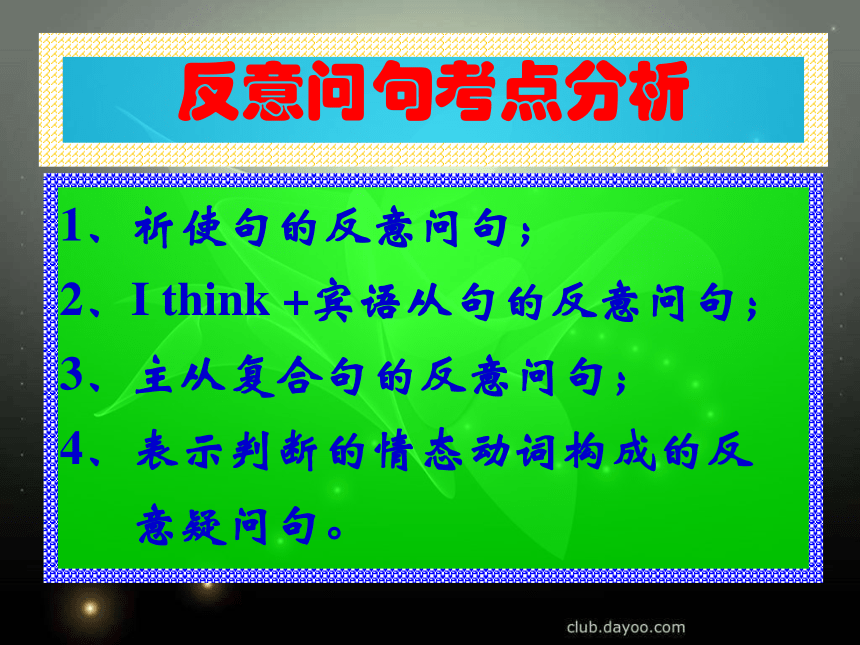
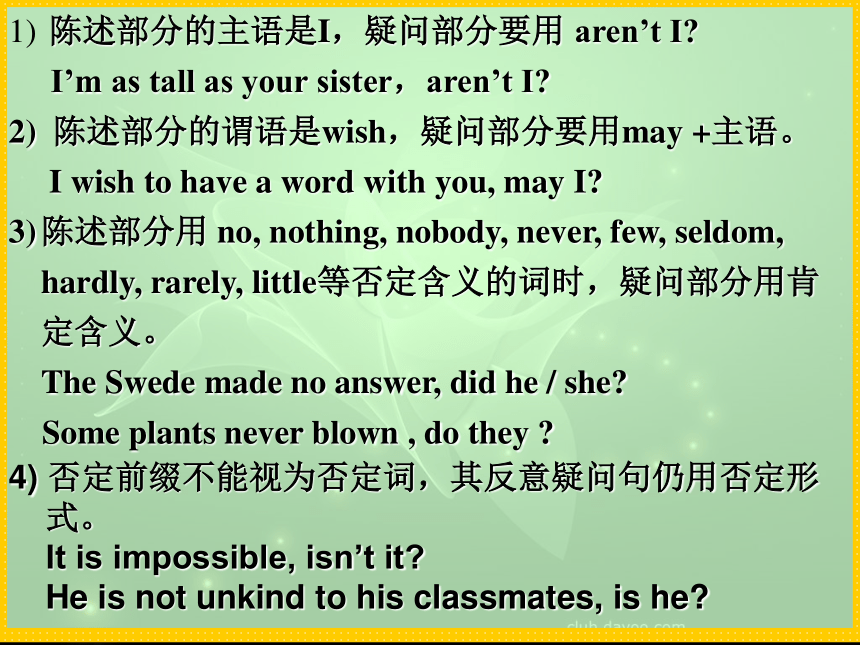
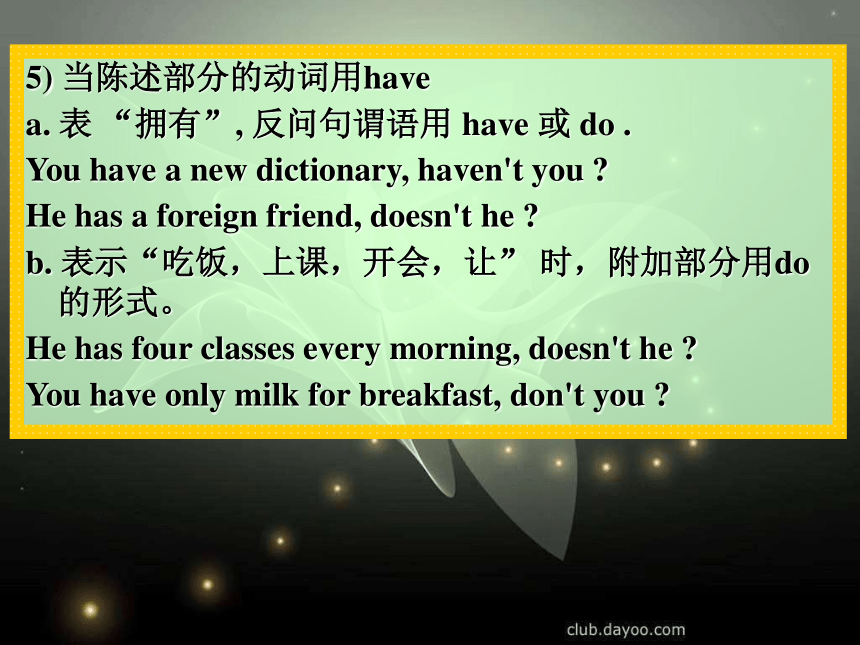
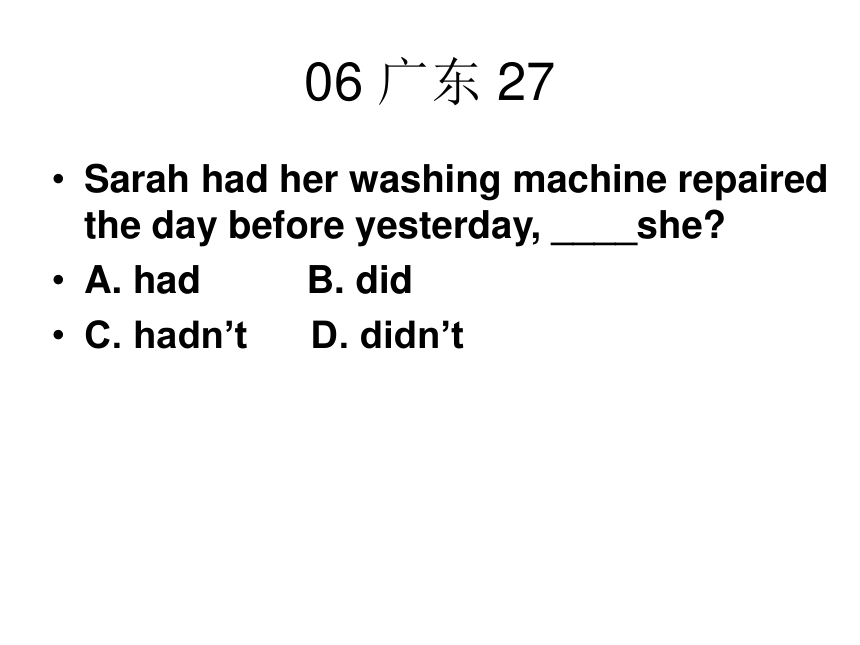
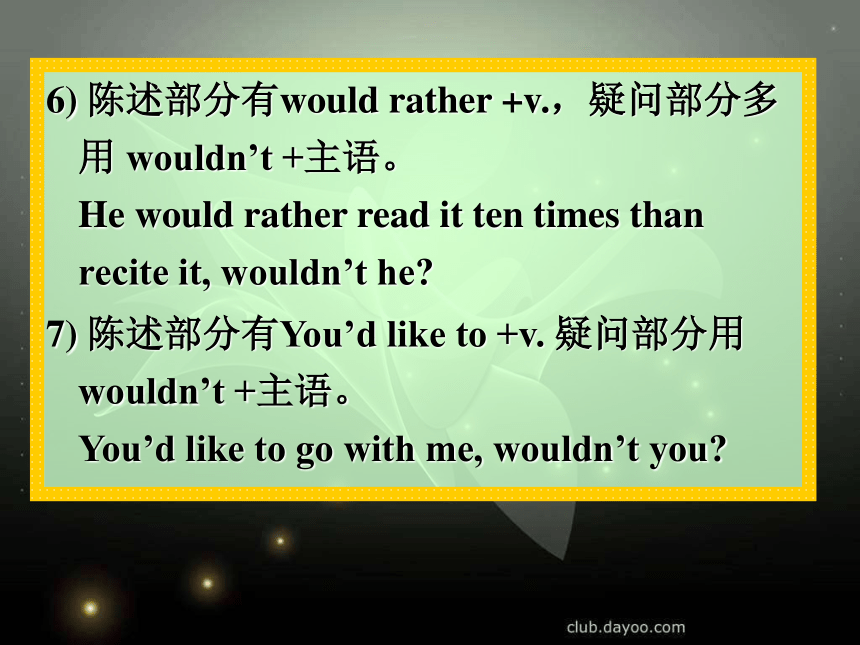
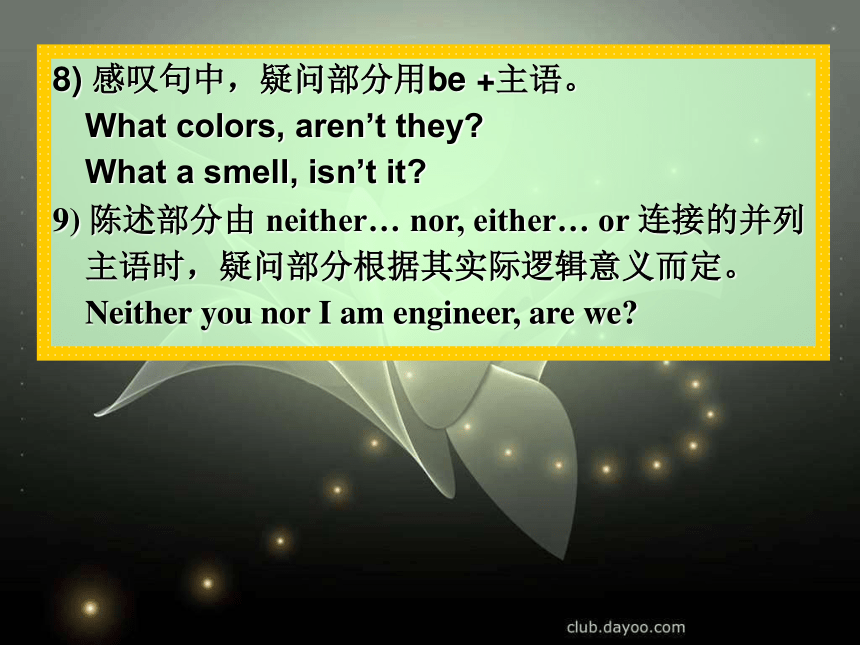
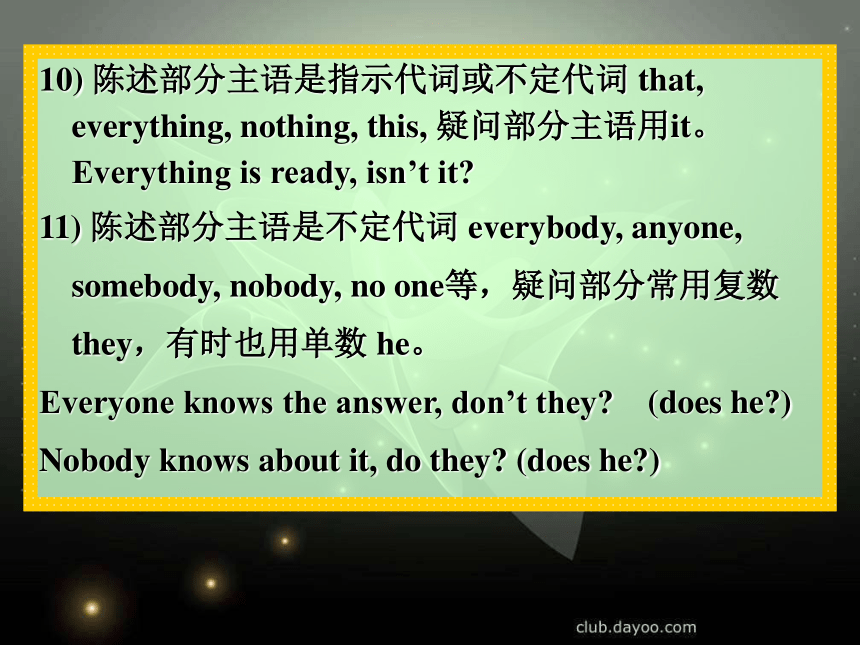
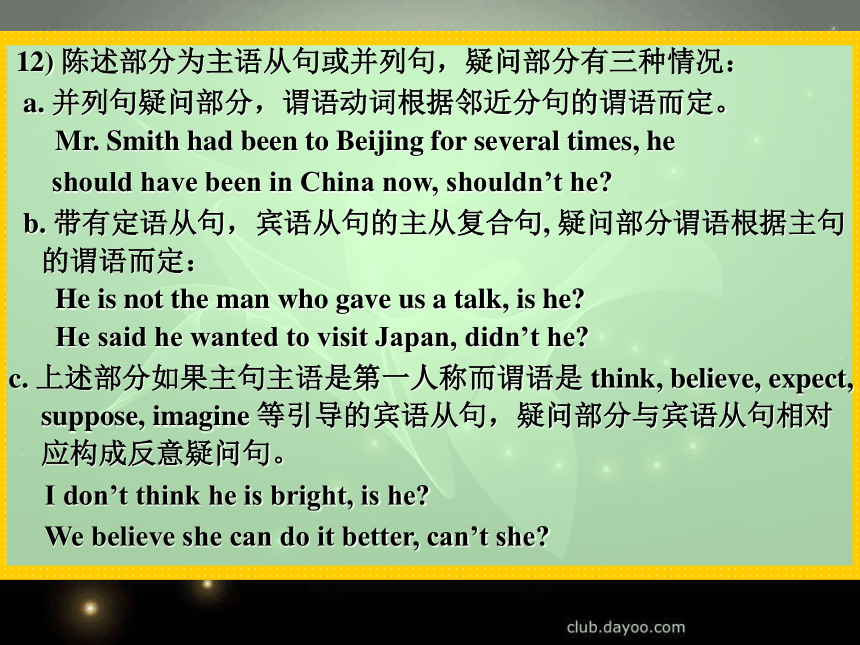
文档简介
课件23张PPT。反意问句1、祈使句的反意问句;
2、I think +宾语从句的反意问句;
3、主从复合句的反意问句;
4、表示判断的情态动词构成的反
意疑问句。反意问句考点分析 陈述部分的主语是I,疑问部分要用 aren’t I?
I’m as tall as your sister,aren’t I?
2) 陈述部分的谓语是wish,疑问部分要用may +主语。 I wish to have a word with you, may I?
陈述部分用 no, nothing, nobody, never, few, seldom, hardly, rarely, little等否定含义的词时,疑问部分用肯定含义。 The Swede made no answer, did he / she?
Some plants never blown , do they ?
4) 否定前缀不能视为否定词,其反意疑问句仍用否定形
式。
It is impossible, isn’t it?
He is not unkind to his classmates, is he? 5) 当陈述部分的动词用have
a.?表 “拥有”, 反问句谓语用 have 或 do .
You have a new dictionary, haven't you ?
He has a foreign friend, doesn't he ?
b. 表示“吃饭,上课,开会,让” 时,附加部分用do的形式。
He has four classes every morning, doesn't he ?
You have only milk for breakfast, don't you ?06 广东 27Sarah had her washing machine repaired the day before yesterday, ____she?
A. had B. did
C. hadn’t D. didn’t6) 陈述部分有would rather +v.,疑问部分多用 wouldn’t +主语。 He would rather read it ten times than recite it, wouldn’t he?
7) 陈述部分有You’d like to +v. 疑问部分用wouldn’t +主语。 You’d like to go with me, wouldn’t you? 8) 感叹句中,疑问部分用be +主语。 What colors, aren’t they? What a smell, isn’t it?
9) 陈述部分由 neither… nor, either… or 连接的并列主语时,疑问部分根据其实际逻辑意义而定。 Neither you nor I am engineer, are we?10) 陈述部分主语是指示代词或不定代词 that, everything, nothing, this, 疑问部分主语用it。 Everything is ready, isn’t it?
11) 陈述部分主语是不定代词 everybody, anyone, somebody, nobody, no one等,疑问部分常用复数they,有时也用单数 he。
Everyone knows the answer, don’t they? (does he?)
Nobody knows about it, do they? (does he?) 12) 陈述部分为主语从句或并列句,疑问部分有三种情况:
a. 并列句疑问部分,谓语动词根据邻近分句的谓语而定。 Mr. Smith had been to Beijing for several times, he
should have been in China now, shouldn’t he?
b. 带有定语从句,宾语从句的主从复合句, 疑问部分谓语根据主句的谓语而定: He is not the man who gave us a talk, is he? He said he wanted to visit Japan, didn’t he?
c. 上述部分如果主句主语是第一人称而谓语是 think, believe, expect, suppose, imagine 等引导的宾语从句,疑问部分与宾语从句相对应构成反意疑问句。
I don’t think he is bright, is he?
We believe she can do it better, can’t she? 2008上海You didn’t use to like him much when we were at school,____?
A. do you B. weren’t you
C. did you D. didn’t you2005北京春He never said that he was good at mathematics,
_____?
A: was he B: wasn’t he
C: did he D: didn’t he06 福建 29I’m sure you’d rather she went to school by bus, _____?
A. hadn’t you B. wouldn’t you
C. aren’t you D. didn’t she13) 省去主语的祈使句的反意疑问句,疑问部
分用will you。 Don’t do that again, will you? Go with me, will you / won’t you ? 注意: Let’s 开头的祈使句,后用 shall we? Let us 开头的祈使句,后用will you? Let’s go and listen to the music, shall we? Let us wait for you in the reading-room, will you ?2007北京When you have finished with that book, don’t forget to put it back on the shelf,___?
A. do you B. don’t you
C. will you D. won’t you 2006全国2,9We forget to bring our tickets, but please let us enter,______?
A. do you B. can we
C. will you D. shall we 16) 陈述部分是“there be”结构的,疑问部分用there省略主语代词。
There is something wrong with your watch,
isn’t there?
There will not be any trouble, will there?(04上海春季)There is no light in the dormitory. They must have gone to the lecture, _______?
A. didn't they B. don' t they
C. mustn't they D. haven' t they
15)情态动词
a.含有ought to 的反意疑问句,陈述部分是肯定的,疑问部分用 shouldn’t/oughtn’t +主语。
He ought to know what to do, oughtn’t he? / shouldn’t he?
b. 陈述部分的谓语是used to 时,疑问部分用didn’t +主语或 usedn’t +主语。
He used to take pictures there, didn’t ( usedn’t) he?
c. 陈述部分有 had better + v. 疑问句部分用hadn’t you?
You’d better read it by yourself, hadn’t you?d. 陈述部分有have to +v. (had to + v.),疑问部分常用don’t +主语(didn’t +主语)。
We have to get there at eight tomorrow, don’t we?
e. 带情态动词 dare 或 need 的反意疑问句,疑问部
分常用 need (dare ) +主语。
We need not do it again, need we ?
He dare not say so, dare you?
当dare, need 为实义动词时,疑问部分用助动词do
+ 主语。
She doesn’t dare to go home alone, does she? f. must2005上海There was a loud scream from the backstage immediately after the concert ended,______?
A. wasn’t there
B. was there
C. didn’t it
D. did it
答案:A2004上海春There is no light in the dormitory. They must have gone to the theatre,______?
A: didn’t they B: don’t they
C: mustn’t they D: haven’t the反意疑问句的回答yes+肯定
no+否定
2、I think +宾语从句的反意问句;
3、主从复合句的反意问句;
4、表示判断的情态动词构成的反
意疑问句。反意问句考点分析 陈述部分的主语是I,疑问部分要用 aren’t I?
I’m as tall as your sister,aren’t I?
2) 陈述部分的谓语是wish,疑问部分要用may +主语。 I wish to have a word with you, may I?
陈述部分用 no, nothing, nobody, never, few, seldom, hardly, rarely, little等否定含义的词时,疑问部分用肯定含义。 The Swede made no answer, did he / she?
Some plants never blown , do they ?
4) 否定前缀不能视为否定词,其反意疑问句仍用否定形
式。
It is impossible, isn’t it?
He is not unkind to his classmates, is he? 5) 当陈述部分的动词用have
a.?表 “拥有”, 反问句谓语用 have 或 do .
You have a new dictionary, haven't you ?
He has a foreign friend, doesn't he ?
b. 表示“吃饭,上课,开会,让” 时,附加部分用do的形式。
He has four classes every morning, doesn't he ?
You have only milk for breakfast, don't you ?06 广东 27Sarah had her washing machine repaired the day before yesterday, ____she?
A. had B. did
C. hadn’t D. didn’t6) 陈述部分有would rather +v.,疑问部分多用 wouldn’t +主语。 He would rather read it ten times than recite it, wouldn’t he?
7) 陈述部分有You’d like to +v. 疑问部分用wouldn’t +主语。 You’d like to go with me, wouldn’t you? 8) 感叹句中,疑问部分用be +主语。 What colors, aren’t they? What a smell, isn’t it?
9) 陈述部分由 neither… nor, either… or 连接的并列主语时,疑问部分根据其实际逻辑意义而定。 Neither you nor I am engineer, are we?10) 陈述部分主语是指示代词或不定代词 that, everything, nothing, this, 疑问部分主语用it。 Everything is ready, isn’t it?
11) 陈述部分主语是不定代词 everybody, anyone, somebody, nobody, no one等,疑问部分常用复数they,有时也用单数 he。
Everyone knows the answer, don’t they? (does he?)
Nobody knows about it, do they? (does he?) 12) 陈述部分为主语从句或并列句,疑问部分有三种情况:
a. 并列句疑问部分,谓语动词根据邻近分句的谓语而定。 Mr. Smith had been to Beijing for several times, he
should have been in China now, shouldn’t he?
b. 带有定语从句,宾语从句的主从复合句, 疑问部分谓语根据主句的谓语而定: He is not the man who gave us a talk, is he? He said he wanted to visit Japan, didn’t he?
c. 上述部分如果主句主语是第一人称而谓语是 think, believe, expect, suppose, imagine 等引导的宾语从句,疑问部分与宾语从句相对应构成反意疑问句。
I don’t think he is bright, is he?
We believe she can do it better, can’t she? 2008上海You didn’t use to like him much when we were at school,____?
A. do you B. weren’t you
C. did you D. didn’t you2005北京春He never said that he was good at mathematics,
_____?
A: was he B: wasn’t he
C: did he D: didn’t he06 福建 29I’m sure you’d rather she went to school by bus, _____?
A. hadn’t you B. wouldn’t you
C. aren’t you D. didn’t she13) 省去主语的祈使句的反意疑问句,疑问部
分用will you。 Don’t do that again, will you? Go with me, will you / won’t you ? 注意: Let’s 开头的祈使句,后用 shall we? Let us 开头的祈使句,后用will you? Let’s go and listen to the music, shall we? Let us wait for you in the reading-room, will you ?2007北京When you have finished with that book, don’t forget to put it back on the shelf,___?
A. do you B. don’t you
C. will you D. won’t you 2006全国2,9We forget to bring our tickets, but please let us enter,______?
A. do you B. can we
C. will you D. shall we 16) 陈述部分是“there be”结构的,疑问部分用there省略主语代词。
There is something wrong with your watch,
isn’t there?
There will not be any trouble, will there?(04上海春季)There is no light in the dormitory. They must have gone to the lecture, _______?
A. didn't they B. don' t they
C. mustn't they D. haven' t they
15)情态动词
a.含有ought to 的反意疑问句,陈述部分是肯定的,疑问部分用 shouldn’t/oughtn’t +主语。
He ought to know what to do, oughtn’t he? / shouldn’t he?
b. 陈述部分的谓语是used to 时,疑问部分用didn’t +主语或 usedn’t +主语。
He used to take pictures there, didn’t ( usedn’t) he?
c. 陈述部分有 had better + v. 疑问句部分用hadn’t you?
You’d better read it by yourself, hadn’t you?d. 陈述部分有have to +v. (had to + v.),疑问部分常用don’t +主语(didn’t +主语)。
We have to get there at eight tomorrow, don’t we?
e. 带情态动词 dare 或 need 的反意疑问句,疑问部
分常用 need (dare ) +主语。
We need not do it again, need we ?
He dare not say so, dare you?
当dare, need 为实义动词时,疑问部分用助动词do
+ 主语。
She doesn’t dare to go home alone, does she? f. must2005上海There was a loud scream from the backstage immediately after the concert ended,______?
A. wasn’t there
B. was there
C. didn’t it
D. did it
答案:A2004上海春There is no light in the dormitory. They must have gone to the theatre,______?
A: didn’t they B: don’t they
C: mustn’t they D: haven’t the反意疑问句的回答yes+肯定
no+否定
